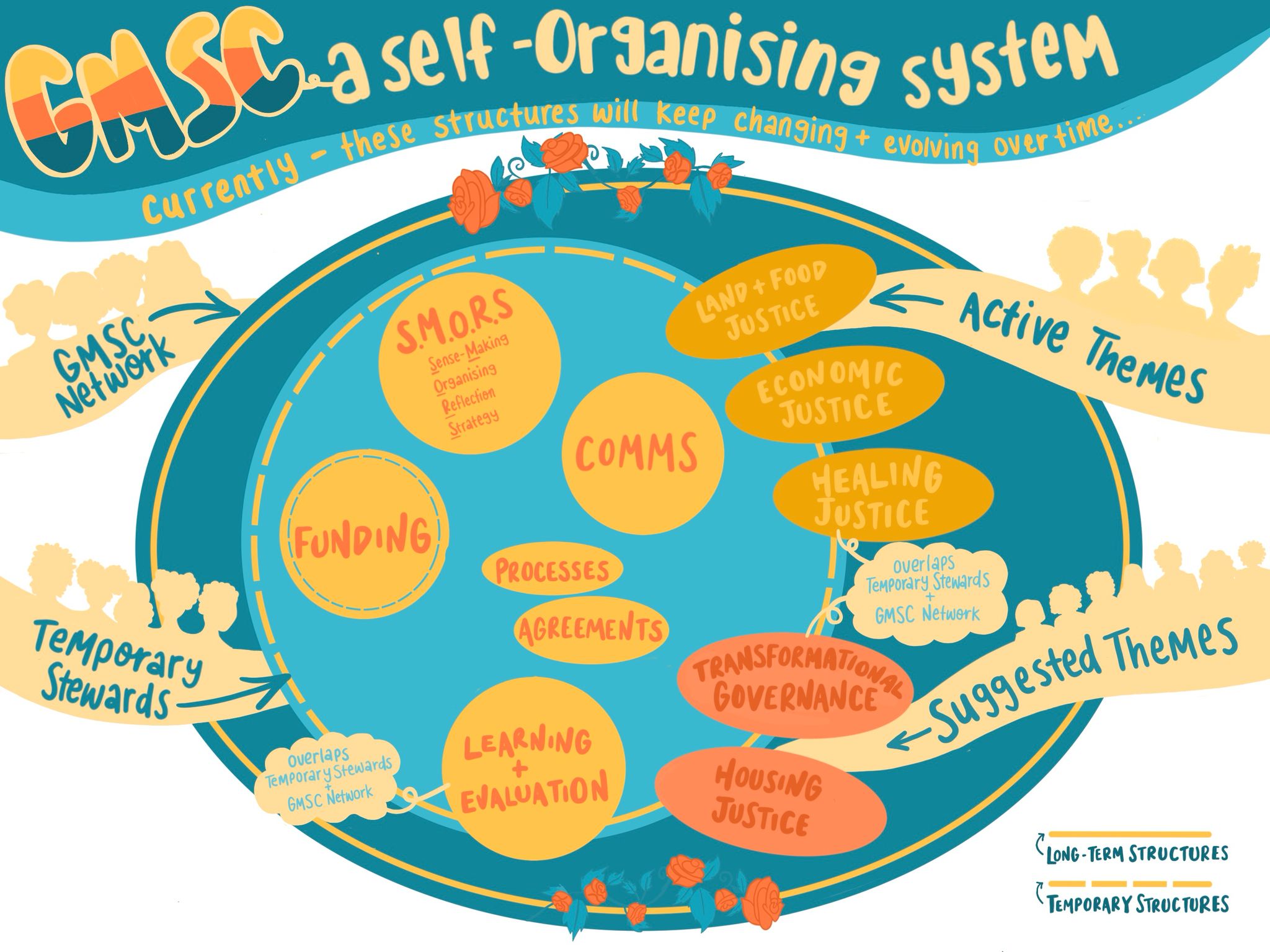
At GM SC, we believe that accountability and governance should not be rigid, top-down structures but instead living systems that evolve with us. Our Temporary Stewards group has worked collaboratively to develop agreements that guide how we operate together, agreements rooted in shared responsibility, transparency, and collective care.
This blog outlines the agreements shaping our governance, decision-making, feedback, and conflict resolution processes. These are not static rules but evolving commitments that reflect our ongoing journey toward self-organizing, relational accountability, and collective liberation.
Our structures and roles
The GM SC network is made up of partners, it is currently stewarded by a group of Temporary Stewards. The Temporary Stewards have different roles and come from different organising themes within the network to ensure that different perspectives are represented. Our governance structure includes:
- The SMORS Group (Sense-making, Organising, Reflection & Strategy)
- The learning and evaluation team
- The finance and admin team
- The processes holding team
- The Communications team
- Temporary Working Groups (e.g., events organising, accountability action plan group)
Each of these groups plays a role in shaping how we collectively make decisions, allocate resources, and practice accountability.
How we are together
Our agreements are designed to create a culture of respect, openness, and intentionality. They include principles such as:
- Listening from the heart with openness and curiosity.
- Speaking from personal experience and owning our perspectives.
- Balancing space in conversations—encouraging those who speak often to listen more and those who speak less to take up space.
- Welcoming different types of engagement while being aware of power dynamics.
- Prioritizing accessibility and care for each other.
- Fostering curiosity, self-awareness, and adaptability.
Decision-Making
We use a mix of structured and intuitive decision-making processes, including deep democracy, which involves:
- Hearing all perspectives before making a decision.
- Voting, followed by exploring what it would take for dissenters to come along.
- Allowing asynchronous input from those not present at meetings.
- Documenting agreements and meeting decisions transparently.
Some decisions are delegated to subgroups, but major strategic choices are made collectively at TS meetings. Financial decisions follow a clear flow, starting with the finance role and escalating to TS or partners as needed.
Navigating conflict with care
Conflict is inevitable in any collective, but how we handle it determines our strength as a group. Our conflict principles include:
- Feedback should be given directly when possible.
- No one should be left alone with unresolved issues.
- Restoring relationships is the priority.
- Conflict resilience should be embedded across the network.
Our process encourages individuals to:
- Name and acknowledge conflicts early.
- Seek support from trusted peers or conflict support stewards.
- Utilise different resolution strategies, including mediation, healing spaces, and deep democracy processes.
We also developed an Accountability Framework to prevent harm and ensure shared accountability.
Resource and information flow
We also have structured agreements around transparency in finances and communications:
- Social Change Nest handles our invoicing, with open access for stewards.
- A set budget for TS participation, with clear processes for additional funding requests.
- Defined pathways for sharing information across the network, ensuring all partners can keep track of our work.
This governance framework is a work in progress. It will continue to evolve as we learn, adapt, and refine our practices. As we (potentially) build a self-organising, self-governing network, we remain committed to accountability that is rooted in trust, care, and the principles of collective liberation.
